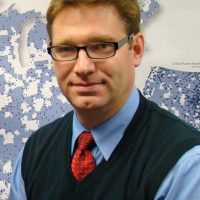
Dr. Mark Holmes tailors public health solutions for rural communities.

What’s your role in public health?
I’m a professor of health policy and management at the Gillings School and the director of the Sheps Center for Health Services Research. My main research interest is rural health, which I’ve studied for 20 years. More broadly, I use administrative data to inform public policy. Sometimes I use really common data like insurance claims; sometimes I work with esoteric data that we need to be creative about in order to answer an emerging question. For example, most people in public health don’t spend a lot of time thinking about where meat processing plants are located, but it became very important in the early parts of the COVID-19 pandemic. We had to find data on the plants, build systems to analyze it and then track how those locations were influencing county infection rates.

Can you describe your focus area in one sentence?
Rural hospitals are not just small hospitals.
Rural communities have different assets and challenges than urban communities. We need to think about solutions that are tailored to them.
Here’s a challenge, for example: Someone in a rural community might not be able to get chemotherapy locally. If they don’t have a car, they have to figure out how they’re going to travel to access that service.
But here’s an asset: Rural communities tend to have tighter social fabric and cohesion. I grew up in a small town, so I remember going to the grocery store and seeing my school principal, which was terribly embarrassing as student but reinforced that I lived in a self-contained unit of about 5,000 people all served by same store. We made a complete ecosystem together. When you know everyone who lives around you, it affects everything from how you react when someone cuts you off in traffic — What if they go to my church? I don’t want to be too rude. — to how you think about your responsibilities within that society.
Rural communities tend to value independence and self-reliance. While these traits can conflict with some public health elements and initiatives, they align perfectly with others, especially in the case of a crisis facing the community. Imagine there’s a problem with teenage drunk driving. In an urban area, you might see a public health organization or a corporate entity grant money and employ a consultant to address the issue. In a rural community, it’s more likely that the hardware store owner (who’s a parent) and the biology teacher (who’s tired of losing students) and the car dealer (who feels a sense of responsibility) will all sit down together and make a plan. The leadership is closer to the people affected, which offers different kinds of approaches and solutions. You hear of academics conducting community-engaged research and practice; rural communities do that organically.

What brought you to public health?

“I grew up in rural Michigan as a total math geek.”
I grew up in rural Michigan as a total math geek. I soon discovered that unless I wanted to be an actuary or work for the National Security Agency, I didn’t have a future in math unless I found a way to apply it. I discovered economics and, in the second year of my doctoral studies at UNC, my adviser said, “I have a line on a job and dissertation with cool data.” I said, “Cool!” and caught the bug for the work.
I started as a labor economist looking at how physicians choose where to locate their practices, which is essentially a labor question with a health focus. It made me remember how, as a kid, I had to travel 30 minutes to the nearest dentist and the neurologist only stopped by the hospital every third Tuesday. Public health really spoke to a nice combination of data, public policy and personal interest in the experience I’d had.
And that’s what I especially like about public health: The ability to apply it to policy. Seeing articles in print is cool and always made my parents proud, but when a policy that you helped inform — even a little bit — gets enacted, that sticks with you for years. I’ve noticed that when my mentors reflect back on their careers, they don’t talk about grants or accolades. It’s always, “Here’s a program in North Carolina that I helped design.”
My day job is in the Federal Office of Rural Health Policy. We’ve been tracking rural hospital closures for almost ten years now, and multiple members of Congress are interested, especially in what’s going on in their states. We advise their staff on what they should focus on to best serve their communities. Down the line, we’ll often see our suggestions in a proposed bill. Even if the bill isn’t passed, it builds interest and moves the needle on those ideas.
I really like being part of the Gillings community, too, because I learn from students every day and have the full support of my colleagues. What I’ve seen over the past 1.5 years in particular is how different people have stepped up to help each other. The person propping me up changes over time, and the person I stand behind changes, but the constant is how we all believe in service and we want to make North Carolina and the world a better place. That passion shows each and every day.

How have you pivoted in response to the coronavirus pandemic?
In February 2020, it became clear what was coming, but I was only responding at a personal level because I wasn’t sure what I could offer professionally. I was vaguely aware of all these infectious disease models I couldn’t contribute to. But it became clear by mid-March that this would be all hands on deck and everyone had something to share. I saw an angle where I could use hospital data to inform infection prevention and response strategies in rural communities, and I also accepted that the pandemic would necessitate a “good enough” mentality around research.

Dr. Holmes looks a little different now.
That sounds bad, but when the secretary of health and human services and the governor say, “We need an answer in five days,” you don’t get to reply, “I’m still six months away from the first iteration of the model.” You just have to ask, “What can we do to inform the best decision-making with incomplete data? What can we design in the next five days to maximize evidence-based policy making?” I’ve learned that policymakers often have to be comfortable with a higher degree of uncertainty than we like to see in science.
There was blow back during the pandemic on things scientists got wrong: Should we wear masks or not? Should we leave our mail in the garage for three days or not? But science is iterative, and having a perfect answer six months later is useless when people are dying today.
And that leads me to a positive silver lining of this pandemic: The public has learned more about how researchers model possible outcomes, and the media has learned not to over-interpret results or report projected outcomes as definitive — rather, they share the “latest estimates.” I personally have a lot of respect for any person who walks into the arena and says, “We need to know something; here’s what I have. I know it won’t be right, but maybe it will be useful.”

Who are you when you’re at home?
Unlike my work life, my home life is fairly predictable from year to year. I grow a garden that feeds squirrels and deer, from which I harvest only weeds. Until, I don’t know, mid-September, I irrationally believe this is the year the Detroit Lions will win the Super Bowl. I put on weight May to December and then lose it January to April. I ask my colleague and friend George Pink to educate me about Canadian holidays. I develop a foolproof plan to ensure my kids will finally do their part to take care of the dog that — somehow — falls short (again). All in all, it’s a pretty great existence.
